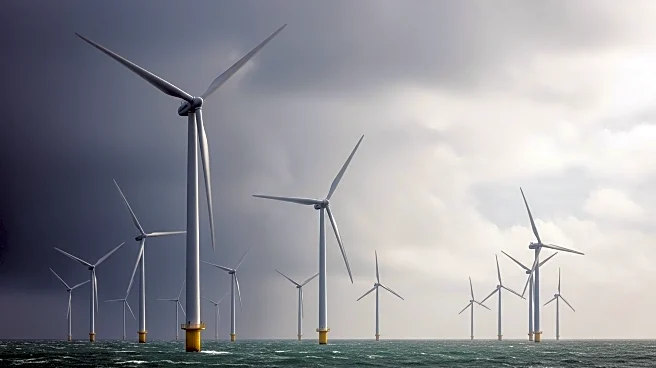What's Happening?
The U.S. offshore wind sector is facing significant challenges due to a policy overhaul by the Trump administration. Executive orders have halted new project approvals, rescinded 3.5 million acres of designated wind zones, and suspended federal leasing, all under the 'America First Energy Dominance' initiative. These actions have led to legal battles and financial losses, with companies like Ørsted and Equinor experiencing project halts and stock declines. Ørsted's Revolution Wind project, 80% complete, was stopped in August 2025, causing a 17% drop in its shares. The regulatory changes have resulted in a $205 billion drop in U.S. renewable energy investment in the first half of 2025.
Why It's Important?
The policy changes have created a hostile environment for offshore wind developers, impacting the renewable energy sector's growth and investment strategies. The halt in projects and rescinded wind zones have led to significant financial losses for key players, destabilizing the market. The shift towards traditional energy sectors, such as fossil fuels and nuclear, is evident as these sectors benefit from streamlined permits. The legal challenges and market turmoil highlight the broader implications of the administration's energy policies, affecting employment and investment in renewable energy.
What's Next?
The ongoing legal challenges from 17 states and the District of Columbia against the administration's executive order could shape the future of offshore wind development. Investors are diversifying into more stable markets in Europe and Asia-Pacific, while companies like Vestas secure contracts in these regions. The long-term outlook for the energy transition remains positive, with global decarbonization efforts continuing despite U.S. policy setbacks. The sector's resilience will depend on balancing traditional energy stability with renewable investments.
Beyond the Headlines
The policy shift has fragmented the energy landscape, with state-level policies and market forces still driving renewable growth. The Inflation Reduction Act and initiatives in states like Texas support onshore wind installations. The regulatory uncertainty has created a 'regulatory lottery' for developers, affecting blue-collar employment and investment confidence. The global shift towards clean energy, evidenced by China's and the EU's initiatives, suggests that the U.S. may eventually align with international trends.









